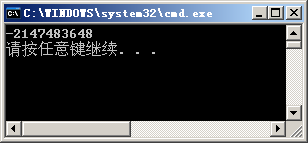Home >Backend Development >C#.Net Tutorial >C# difficulties are solved one by one (7): checked and unchecked
C# difficulties are solved one by one (7): checked and unchecked
- 黄舟Original
- 2016-12-22 14:20:341228browse
C# By default, if the value of a constant expression exceeds the maximum value of the target type, a compilation error will occur.

If the target data type cannot accommodate the data of non-constant expressions, the data will be truncated during assignment.
class Program
{
static void Main(string[] args)
{
int n = int.MaxValue;//n=2147483647
n = n + 1;
System.Console.WriteLine(n);
}
}
At this time, it can be explained by memory storage data. Previously, int.MaxValue was 32-bit 1 in the memory. After adding 1, it becomes 32-bit 0. At this time, 0 is considered to be a negative sign, so it will be obtained -2147483648.
Placing the above code in the checked block will cause a System.OverflowException type.
class Program
{
static void Main(string[] args)
{
checked
{
int m = int.MaxValue;
m = m + 1;
System.Console.WriteLine(m);
}
}
}
For variables placed in checked blocks in C#, if an overflow assignment occurs during runtime, an exception will be thrown.
unchecked is used to cancel overflow checking of integer arithmetic operations and conversions.
The above is the content of C# difficulties one by one (7): checked and unchecked. For more related content, please pay attention to the PHP Chinese website (www.php.cn)!

